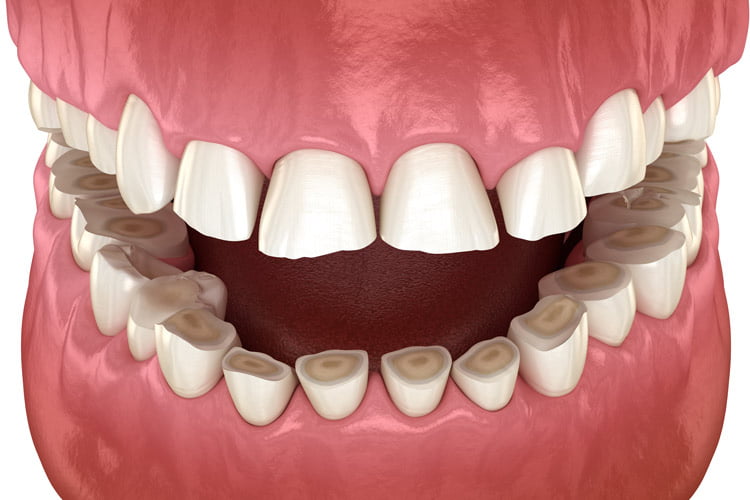Bruxism
a common condition in which excessive teeth clenching or grinding occurs.
Our Madison area dentists work with you to find an appropriate treatment plan.
Many people experience stress and find themselves clenching or grinding their teeth together as a result. Abnormal clenching and grinding of the teeth is called bruxism. Bruxism can be a daily or nightly occurrence for certain individuals, potentially leading to harmful consequences to the teeth, jaw joints, and muscles of the face and neck. Dental Health Associates of Madison dentists can assist you with identifying a treatment plan for your bruxism.

Bruxism and Me
It is important to understand bruxism and its effects on your body. Left untreated, it can cause permanent damage to your teeth and unnecessary pain in your face and jaw.
Issues Caused By Clenching or Grinding Your Teeth
Bruxism can be extremely harmful to your teeth. Over time, untreated bruxism can lead to worn away enamel and dentin, fractured or broken teeth and fillings, nerve exposure, and even tooth loss. Your jaw also suffers from excessive grinding and clenching of your teeth. Excess pressure on your jaw joints can cause or worsen existing TMJ issues, leading to pain in the joint and adjacent muscles, and even make it difficult to eat or speak without pain.
Treatment Options If You Grind Your Teeth
If you are experiencing regular bruxism, we suggest that you schedule an examination with your DHA dentist to prevent or stop permanent damage to your teeth. At your appointment, your DHA dentist will assess your teeth, joints, muscles, and symptoms to create a plan to address your unique diagnosis. Many patients find relief and protection for their teeth from a simple custom made mouthguard, especially if they grind while sleeping. There are multiple types of guards and splints that can be made for you, based on your grinding habits and symptoms. Additional treatment may be recommended, including bite adjustment, jaw exercises, medications, or physical therapy.
Bruxism FAQs
Many cases of bruxism are caused by stress. It is widely known that stress can have negative effects on mind and body, but many people do not realize that this includes their teeth, jaw joints, and muscles of the head and neck. Nighttime grinding and clenching are often side-effects of untreated stress. This extra strain can lead to permanent wearing away of tooth structure, headache, toothache, and muscle and joint pain and fatigue. Other causes include certain medications and sleep disorders, such as sleep apnea. Caffeine, nicotine, and alcohol can also increase the risk for bruxism.
The cost of a bruxism guard varies depending on the type of device needed, based on your unique symptoms. Dental insurance coverage for custom made guards and splints also vary greatly, with many plans offering no coverage. In certain situations, your medical insurance may offer coverage for TMJ related treatment and guards. Your specific coverage depends on your insurance company and individual plan. To find out what percentage may be covered by your insurance plan, refer to the information provided to you when you enrolled, or call the 1-800 number on the back of your card to ask a representative. If you need help obtaining this information, a Dental Health Associates front desk staff member would be happy to help you. If you are a DHA patient, our financial coordinators will help you obtain an estimate of coverage if requested.
Patient Information
We encourage new patients to fill out a new patient form online prior to your first appointment. Be sure to select the appropriate location for your new patient forms, as once you complete them, they are sent electronically to the office you’ve chosen.
Insurance
Medical and dental insurance can be confusing. Our staff has experience with your questions and can help you get the most from your insurance.
No insurance? Apply today.